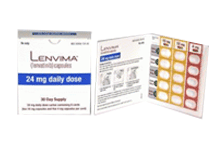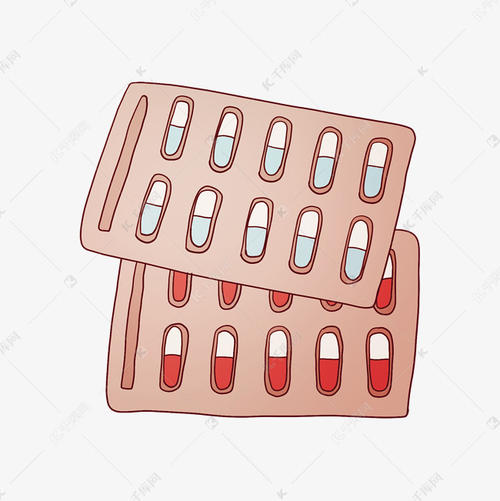乐伐替尼胶囊Lenvima 24mg capsules(lenvatinib)
 药店国别:
产地国家:美国
处方药:是
所属类别: 24毫克/胶囊 30胶囊/盒
包装规格: 24毫克/胶囊 30胶囊/盒
计价单位:盒
生产厂家中文参考译名:
生产厂家英文名:Eisai Co.,Ltd.
原产地英文商品名:LENVIMA 24mg/cap 30cap/box
原产地英文药品名:lenvatinib
中文参考商品译名:LENVIMA胶囊 24毫克/胶囊 30胶囊/盒
中文参考药品译名:乐伐替尼
曾用名:
简介:部份中文乐伐替尼处方资料(仅供参考)英文名:lenvatinib商标名:Lenvima Capsules中文名:乐伐替尼胶囊原研公司:卫材(Eisai)研发批准日期:2017年2月7日(肝细胞癌) 2016年5月20日(肾细胞癌)2015年6月12日(甲状腺癌)药品简介LENVIMA(lenvatinib)胶囊,为口服使用美国初次批准:2015
作用机制
Lenvatinib是一种受体酪氨酸激酶(RTK)抑制剂,抑制血管内皮生长因子(VEGF)受体VEGFR1(FLT1),VEGFR2(KDR),和VEGFR3(FLT4)的激酶活性。Lenvatinib还抑制牵连其他RTKs病理性血管生成,肿瘤生长,和癌进展除了它们的正常细胞功能,包括纤维母细胞生长因子(FGF)受体FGFR1,2,3,和4;血小板衍生生长因子受体α (PDGFRα),KIT,和RET。
适应证和用途
LENVIMA是一种激酶抑制剂适用为有局部地复发或转移,进展性,放射性碘-难治性分化型甲状腺癌患者的治疗。
剂量和给药方法
⑴ 推荐剂量:24mg口服,每天一次.
⑵ 在有严重肾或肝受损患者,剂量是14mg每天一次.
剂型和规格胶囊:
4mg和10mg.
禁忌证
无。
警告和注意事项
⑴ 高血压:用LENVIMA治疗前控制血压。对尽管优化高血压治疗的3级高血压不给LENVIMA。对危及生命高血压终止药物。
⑵ 心力衰竭:监视心脏代偿失调的临床症状和体征。对3级不给LENVIMA心功能不全。对4级心功能不全终止药物。
⑶ 动脉血栓栓塞事件:一次动脉血栓栓塞事件后终止LENVIMA。
⑷ 肝毒性: LENVIMA开始前和治疗自始至终定期地监视肝功能检验. 对3级或更大肝受损不给LENVIMA。对肝衰竭终止治疗。
⑸ 蛋白尿:用LENVIMA开始治疗前,和自始至终定期地,监视蛋白尿。对24小时尿蛋白≥2 克不给LENVIMA。对肾病综合征终止用药。
⑹ 肾衰竭和肾受损: 对3或4级肾衰竭/受损不给LENVIMA。
⑺ 胃肠道穿孔和瘘管形成:发生胃肠道穿孔或危及生命瘘管患者中终止LENVIMA。
⑻ QT间期延长:在所有患者中监视和纠正电解质异常。对发生3级或更大QT间期延长不给LENVIMA。
⑼ 低钙血症:监视血钙水平至少每月和需要时给予替代钙。
⑽ 可逆性后部白质脑病综合征(RPLS): 对RPLS不给LENVIMA直至完全解决。⑾ 出血事件:对3级出血不给LENVIMA。对4级出血终止治疗。
⑿ 甲状腺刺激激素抑制的受损:每月监视TSH水平和有DTC患者需要时调整甲状腺取代药物。
⒀ 胚胎胎儿毒性:可能致胎儿危害。忠告对胎儿潜在风险和使用有效避孕。
不良反应
对LENVIMA最常见不良反应(发生率大于或等于30%)是高血压,疲乏,腹泻,关节痛/肌肉痛,食欲减退,体重减轻,恶心,口炎,头痛,呕吐,蛋白尿,掌,跖红肿综合征,腹痛,和发音困难。
特殊人群中使用
哺乳:终止哺乳喂养。
如何供应/贮存和处置
LENVIMA 4mg胶囊是以硬羟丙甲纤维素胶囊供应。有泛黄红色体部和泛黄红色帽,帽上用黑墨汁标记有“Є”和体部为“LENV 4mg”。LENVIMA 10mg胶囊以硬羟丙甲纤维素胶囊供应有黄色体部和泛黄-红帽,帽上用黑墨汁标记有“Є”和体部为“LENV 10mg”。LENVIMA胶囊以6卡纸盒供应。每卡是一个5-天吸塑卡如下:● NDC 62856-724-30:24mg,6卡纸盒NDC 62856-724-05(10粒10mg胶囊和5粒4mg胶囊每卡)。●NDC 62856-720-30:20mg,6卡纸盒NDC 62856-720-05(10粒10mg胶囊每卡)。● NDC 62856-714-30:14mg,6卡纸盒NDC 62856-714-05(5粒10mg胶囊和5粒4mg胶囊每卡)。● NDC 62856-710-30:10mg,6卡纸盒NDC 62856-710-05(5粒10mg 胶囊每卡)。贮存在25°C(77°F);外出允许至15–30°C(59–86°F)[见USP 控制室温]。
乐伐替尼胶囊英文版说明书
Lenvima, lenvatinib (E7080)A New Drug Approved for the Treatment of Patients with Locally Recurrent or Metastatic, Progressive, Radioactive Iodine-Refractory Differentiated Thyroid CancerLENVIMA, an oral capsule taken once daily, was approved by the U.S. Food and Drug Administration (FDA) on February 13, 2015, following a Priority Review by the FDA. Priority Review is designated for drugs that the FDA believes have the potential to provide a significant improvement of a serious condition.About LENVIMA™ (lenvatinib)LENVIMA™ (lenvatinib) is indicated for the treatment of patients with locally recurrent or metastatic, progressive, radioactive iodine-refractory differentiated thyroid cancer (DTC).LENVIMA, discovered and developed by Eisai, is a receptor tyrosine kinase (RTK) inhibitor that inhibits the kinase activities of vascular endothelial growth factor (VEGF) receptors VEGFR1 (FLT1), VEGFR2 (KDR), and VEGFR3 (FLT4). LENVIMA also inhibits other RTKs that have been implicated in pathogenic angiogenesis, tumor growth, and cancer progression in addition to their normal cellular functions, including fibroblast growth factor (FGF) receptors FGFR1, 2, 3, and 4; the platelet derived growth factor receptor alpha (PDGFRa), KIT, and RET. It is currently under investigation in hepatocellular, renal cell carcinoma, endometrial, anaplastic thyroid cancer, non-small cell lung cancer and other solid tumor types. LENVIMA was granted the Priority Review designation by the FDA in October 2014. Eisai was granted Orphan Drug Designation (ODD) for lenvatinib in various types of thyroid cancer in the United States, Japan, and Europe.LENVIMA™ (lenvatinib) Important Safety InformationWarnings and PrecautionsHypertension was reported in 73% of LENVIMA-treated patients (of which 44% were > Grade 3) and 16% of patients in the placebo group. Control blood pressure prior to treatment and monitor blood pressure after 1 week, then every 2 weeks for the first 2 months, and then at least monthly during treatment. Withhold LENVIMA for Grade 3 hypertension; resume at a reduced dose when hypertension is controlled at = Grade 2. Discontinue LENVIMA for life-threatening hypertension.Cardiac dysfunction was reported in 7% of LENVIMA-treated patients (2% Grade 3 or greater). Monitor patients for clinical symptoms or signs of cardiac decompensation. Withhold LENVIMA for development of Grade 3 cardiac dysfunction until improved to Grade 0 or 1 or baseline. Resume at a reduced dose or discontinue LENVIMA depending on the severity and persistence of cardiac dysfunction. Discontinue LENVIMA for Grade 4 cardiac dysfunction.Arterial thromboembolic events were reported in 5% of LENVIMA-treated patients; events of Grade 3 or greater were 3%. Discontinue LENVIMA following an arterial thrombotic event. LENVIMA has not been studied in patients who have had an arterial thromboembolic event within the previous 6 months.4% of LENVIMA-treated patients experienced an increase in ALT and 5% experienced an increase in AST that was Grade 3 or greater. Monitor liver function before initiation and during treatment with LENVIMA. Withhold LENVIMA for the development of > Grade 3 liver impairment until resolved to Grade 0 to 1 or baseline. Resume at a reduced dose or discontinue LENVIMA depending on the severity and persistence of hepatotoxicity. Discontinue LENVIMA for hepatic failure.Proteinuria was reported in 34% of LENVIMA-treated patients (of which 11% were Grade 3). Monitor for proteinuria before initiation of, and periodically during treatment. Obtain a 24 hour urine protein if urine dipstick proteinuria >2+ is detected. Withhold LENVIMA for > 2 grams of proteinuria/24 hours and resume at a reduced dose when proteinuria is <2 gm/24 hours. Discontinue LENVIMA™ (lenvatinib) for nephrotic syndrome.Events of renal impairment were reported in 14% of LENVIMA-treated patients. Renal failure or impairment > Grade 3 was 3% in LENVIMA-treated patients. Withhold LENVIMA for development of Grade 3 or 4 renal failure/impairment until resolved to Grade 0 to 1 or baseline. Resume at a reduced dose or discontinue LENVIMA depending on the severity and persistence of renal impairment.Events of gastrointestinal perforation or fistula were reported in 2% of LENVIMA-treated patients. Discontinue LENVIMA in patients who develop gastrointestinal perforation or life-threatening fistula.QT/QTc interval prolongation was reported in 9% of LENVIMA-treated patients (2% Grade 3 or greater). Monitor ECG in patients with congenital long QT syndrome, CHF, bradyarrhythmias, or patients taking drugs known to prolong the QT interval. Monitor and correct electrolyte abnormalities in all patients. Withhold LENVIMA for the development of > Grade 3 QT interval prolongation. Resume LENVIMA at a reduced dose when QT prolongation resolves to Grade 0 or 1 or baseline.Hypocalcemia > Grade 3 was reported in 9% of LENVIMA-treated patients. Monitor blood calcium levels at least monthly and replace calcium as necessary during LENVIMA treatment. Interrupt and adjust LENVIMA dosing as necessary depending on severity, presence of ECG changes, and persistence of hypocalcemia.Reversible posterior leukoencephalopathy syndrome (RPLS) was reported in 3 patients across clinical studies in which 1108 patients received LENVIMA. Confirm the diagnosis of RPLS with MRI. Withhold LENVIMA for RPLS until fully resolved. Resume at a reduced dose or discontinue LENVIMA depending on the severity and persistence of neurologic symptoms.Hemorrhagic events occurred in 35% of LENVIMA-treated patients and in 18% of the placebo group. The incidence of Grade 3-5 hemorrhage was similar between arms at 2% and 3%, respectively. The most frequently reported hemorrhagic event was epistaxis (11% Grade 1 and 1% Grade 2). Discontinuation due to hemorrhagic events occurred in 1% of LENVIMA-treated patients. There was one case of fatal intracranial hemorrhage among 16 patients who received LENVIMA and had CNS metastases at baseline. Withhold LENVIMA for the development of Grade 3 hemorrhage until resolved to Grade 0 to 1. Resume at a reduced dose or discontinue LENVIMA depending on the severity and persistence of hemorrhage. Discontinue LENVIMA in patients who experience Grade 4 hemorrhage.LENVIMA impairs exogenous thyroid suppression. Elevation of TSH level above 0.5 mU/L was observed post baseline in 57% of LENVIMA-treated patients. Monitor TSH levels monthly and adjust thyroid replacement medication as needed.LENVIMA can cause fetal harm when administered to a pregnant woman. Advise pregnant women of the potential risk to a fetus. Advise females of reproductive potential to use effective contraception during treatment with LENVIMA and for at least 2 weeks following completion of therapy.Advise women not to breastfeed during treatment with LENVIMA.Adverse ReactionsThe most common adverse reactions observed in LENVIMA-treated patients vs. placebo-treated patients respectively were hypertension (73% vs 16%), fatigue (67% vs 35%), diarrhea (67% vs 17%), arthralgia/myalgia (62% vs 28%), decreased appetite (54% vs 18%), weight decreased (51% vs 15%), nausea (47% vs 25%), stomatitis (41% vs 8%), headache (38% vs 11%), vomiting (36% vs 15%), proteinuria (34% vs 3%), palmar-plantar erythrodysesthesia syndrome (32% vs 1%), abdominal pain (31% vs 11%), and dysphonia (31% vs 5%).For more information about LENVIMA, click here for the full Product Information or visit www.LENVIMA.com.
药店国别:
产地国家:美国
处方药:是
所属类别: 24毫克/胶囊 30胶囊/盒
包装规格: 24毫克/胶囊 30胶囊/盒
计价单位:盒
生产厂家中文参考译名:
生产厂家英文名:Eisai Co.,Ltd.
原产地英文商品名:LENVIMA 24mg/cap 30cap/box
原产地英文药品名:lenvatinib
中文参考商品译名:LENVIMA胶囊 24毫克/胶囊 30胶囊/盒
中文参考药品译名:乐伐替尼
曾用名:
简介:部份中文乐伐替尼处方资料(仅供参考)英文名:lenvatinib商标名:Lenvima Capsules中文名:乐伐替尼胶囊原研公司:卫材(Eisai)研发批准日期:2017年2月7日(肝细胞癌) 2016年5月20日(肾细胞癌)2015年6月12日(甲状腺癌)药品简介LENVIMA(lenvatinib)胶囊,为口服使用美国初次批准:2015
作用机制
Lenvatinib是一种受体酪氨酸激酶(RTK)抑制剂,抑制血管内皮生长因子(VEGF)受体VEGFR1(FLT1),VEGFR2(KDR),和VEGFR3(FLT4)的激酶活性。Lenvatinib还抑制牵连其他RTKs病理性血管生成,肿瘤生长,和癌进展除了它们的正常细胞功能,包括纤维母细胞生长因子(FGF)受体FGFR1,2,3,和4;血小板衍生生长因子受体α (PDGFRα),KIT,和RET。
适应证和用途
LENVIMA是一种激酶抑制剂适用为有局部地复发或转移,进展性,放射性碘-难治性分化型甲状腺癌患者的治疗。
剂量和给药方法
⑴ 推荐剂量:24mg口服,每天一次.
⑵ 在有严重肾或肝受损患者,剂量是14mg每天一次.
剂型和规格胶囊:
4mg和10mg.
禁忌证
无。
警告和注意事项
⑴ 高血压:用LENVIMA治疗前控制血压。对尽管优化高血压治疗的3级高血压不给LENVIMA。对危及生命高血压终止药物。
⑵ 心力衰竭:监视心脏代偿失调的临床症状和体征。对3级不给LENVIMA心功能不全。对4级心功能不全终止药物。
⑶ 动脉血栓栓塞事件:一次动脉血栓栓塞事件后终止LENVIMA。
⑷ 肝毒性: LENVIMA开始前和治疗自始至终定期地监视肝功能检验. 对3级或更大肝受损不给LENVIMA。对肝衰竭终止治疗。
⑸ 蛋白尿:用LENVIMA开始治疗前,和自始至终定期地,监视蛋白尿。对24小时尿蛋白≥2 克不给LENVIMA。对肾病综合征终止用药。
⑹ 肾衰竭和肾受损: 对3或4级肾衰竭/受损不给LENVIMA。
⑺ 胃肠道穿孔和瘘管形成:发生胃肠道穿孔或危及生命瘘管患者中终止LENVIMA。
⑻ QT间期延长:在所有患者中监视和纠正电解质异常。对发生3级或更大QT间期延长不给LENVIMA。
⑼ 低钙血症:监视血钙水平至少每月和需要时给予替代钙。
⑽ 可逆性后部白质脑病综合征(RPLS): 对RPLS不给LENVIMA直至完全解决。⑾ 出血事件:对3级出血不给LENVIMA。对4级出血终止治疗。
⑿ 甲状腺刺激激素抑制的受损:每月监视TSH水平和有DTC患者需要时调整甲状腺取代药物。
⒀ 胚胎胎儿毒性:可能致胎儿危害。忠告对胎儿潜在风险和使用有效避孕。
不良反应
对LENVIMA最常见不良反应(发生率大于或等于30%)是高血压,疲乏,腹泻,关节痛/肌肉痛,食欲减退,体重减轻,恶心,口炎,头痛,呕吐,蛋白尿,掌,跖红肿综合征,腹痛,和发音困难。
特殊人群中使用
哺乳:终止哺乳喂养。
如何供应/贮存和处置
LENVIMA 4mg胶囊是以硬羟丙甲纤维素胶囊供应。有泛黄红色体部和泛黄红色帽,帽上用黑墨汁标记有“Є”和体部为“LENV 4mg”。LENVIMA 10mg胶囊以硬羟丙甲纤维素胶囊供应有黄色体部和泛黄-红帽,帽上用黑墨汁标记有“Є”和体部为“LENV 10mg”。LENVIMA胶囊以6卡纸盒供应。每卡是一个5-天吸塑卡如下:● NDC 62856-724-30:24mg,6卡纸盒NDC 62856-724-05(10粒10mg胶囊和5粒4mg胶囊每卡)。●NDC 62856-720-30:20mg,6卡纸盒NDC 62856-720-05(10粒10mg胶囊每卡)。● NDC 62856-714-30:14mg,6卡纸盒NDC 62856-714-05(5粒10mg胶囊和5粒4mg胶囊每卡)。● NDC 62856-710-30:10mg,6卡纸盒NDC 62856-710-05(5粒10mg 胶囊每卡)。贮存在25°C(77°F);外出允许至15–30°C(59–86°F)[见USP 控制室温]。
乐伐替尼胶囊英文版说明书
Lenvima, lenvatinib (E7080)A New Drug Approved for the Treatment of Patients with Locally Recurrent or Metastatic, Progressive, Radioactive Iodine-Refractory Differentiated Thyroid CancerLENVIMA, an oral capsule taken once daily, was approved by the U.S. Food and Drug Administration (FDA) on February 13, 2015, following a Priority Review by the FDA. Priority Review is designated for drugs that the FDA believes have the potential to provide a significant improvement of a serious condition.About LENVIMA™ (lenvatinib)LENVIMA™ (lenvatinib) is indicated for the treatment of patients with locally recurrent or metastatic, progressive, radioactive iodine-refractory differentiated thyroid cancer (DTC).LENVIMA, discovered and developed by Eisai, is a receptor tyrosine kinase (RTK) inhibitor that inhibits the kinase activities of vascular endothelial growth factor (VEGF) receptors VEGFR1 (FLT1), VEGFR2 (KDR), and VEGFR3 (FLT4). LENVIMA also inhibits other RTKs that have been implicated in pathogenic angiogenesis, tumor growth, and cancer progression in addition to their normal cellular functions, including fibroblast growth factor (FGF) receptors FGFR1, 2, 3, and 4; the platelet derived growth factor receptor alpha (PDGFRa), KIT, and RET. It is currently under investigation in hepatocellular, renal cell carcinoma, endometrial, anaplastic thyroid cancer, non-small cell lung cancer and other solid tumor types. LENVIMA was granted the Priority Review designation by the FDA in October 2014. Eisai was granted Orphan Drug Designation (ODD) for lenvatinib in various types of thyroid cancer in the United States, Japan, and Europe.LENVIMA™ (lenvatinib) Important Safety InformationWarnings and PrecautionsHypertension was reported in 73% of LENVIMA-treated patients (of which 44% were > Grade 3) and 16% of patients in the placebo group. Control blood pressure prior to treatment and monitor blood pressure after 1 week, then every 2 weeks for the first 2 months, and then at least monthly during treatment. Withhold LENVIMA for Grade 3 hypertension; resume at a reduced dose when hypertension is controlled at = Grade 2. Discontinue LENVIMA for life-threatening hypertension.Cardiac dysfunction was reported in 7% of LENVIMA-treated patients (2% Grade 3 or greater). Monitor patients for clinical symptoms or signs of cardiac decompensation. Withhold LENVIMA for development of Grade 3 cardiac dysfunction until improved to Grade 0 or 1 or baseline. Resume at a reduced dose or discontinue LENVIMA depending on the severity and persistence of cardiac dysfunction. Discontinue LENVIMA for Grade 4 cardiac dysfunction.Arterial thromboembolic events were reported in 5% of LENVIMA-treated patients; events of Grade 3 or greater were 3%. Discontinue LENVIMA following an arterial thrombotic event. LENVIMA has not been studied in patients who have had an arterial thromboembolic event within the previous 6 months.4% of LENVIMA-treated patients experienced an increase in ALT and 5% experienced an increase in AST that was Grade 3 or greater. Monitor liver function before initiation and during treatment with LENVIMA. Withhold LENVIMA for the development of > Grade 3 liver impairment until resolved to Grade 0 to 1 or baseline. Resume at a reduced dose or discontinue LENVIMA depending on the severity and persistence of hepatotoxicity. Discontinue LENVIMA for hepatic failure.Proteinuria was reported in 34% of LENVIMA-treated patients (of which 11% were Grade 3). Monitor for proteinuria before initiation of, and periodically during treatment. Obtain a 24 hour urine protein if urine dipstick proteinuria >2+ is detected. Withhold LENVIMA for > 2 grams of proteinuria/24 hours and resume at a reduced dose when proteinuria is <2 gm/24 hours. Discontinue LENVIMA™ (lenvatinib) for nephrotic syndrome.Events of renal impairment were reported in 14% of LENVIMA-treated patients. Renal failure or impairment > Grade 3 was 3% in LENVIMA-treated patients. Withhold LENVIMA for development of Grade 3 or 4 renal failure/impairment until resolved to Grade 0 to 1 or baseline. Resume at a reduced dose or discontinue LENVIMA depending on the severity and persistence of renal impairment.Events of gastrointestinal perforation or fistula were reported in 2% of LENVIMA-treated patients. Discontinue LENVIMA in patients who develop gastrointestinal perforation or life-threatening fistula.QT/QTc interval prolongation was reported in 9% of LENVIMA-treated patients (2% Grade 3 or greater). Monitor ECG in patients with congenital long QT syndrome, CHF, bradyarrhythmias, or patients taking drugs known to prolong the QT interval. Monitor and correct electrolyte abnormalities in all patients. Withhold LENVIMA for the development of > Grade 3 QT interval prolongation. Resume LENVIMA at a reduced dose when QT prolongation resolves to Grade 0 or 1 or baseline.Hypocalcemia > Grade 3 was reported in 9% of LENVIMA-treated patients. Monitor blood calcium levels at least monthly and replace calcium as necessary during LENVIMA treatment. Interrupt and adjust LENVIMA dosing as necessary depending on severity, presence of ECG changes, and persistence of hypocalcemia.Reversible posterior leukoencephalopathy syndrome (RPLS) was reported in 3 patients across clinical studies in which 1108 patients received LENVIMA. Confirm the diagnosis of RPLS with MRI. Withhold LENVIMA for RPLS until fully resolved. Resume at a reduced dose or discontinue LENVIMA depending on the severity and persistence of neurologic symptoms.Hemorrhagic events occurred in 35% of LENVIMA-treated patients and in 18% of the placebo group. The incidence of Grade 3-5 hemorrhage was similar between arms at 2% and 3%, respectively. The most frequently reported hemorrhagic event was epistaxis (11% Grade 1 and 1% Grade 2). Discontinuation due to hemorrhagic events occurred in 1% of LENVIMA-treated patients. There was one case of fatal intracranial hemorrhage among 16 patients who received LENVIMA and had CNS metastases at baseline. Withhold LENVIMA for the development of Grade 3 hemorrhage until resolved to Grade 0 to 1. Resume at a reduced dose or discontinue LENVIMA depending on the severity and persistence of hemorrhage. Discontinue LENVIMA in patients who experience Grade 4 hemorrhage.LENVIMA impairs exogenous thyroid suppression. Elevation of TSH level above 0.5 mU/L was observed post baseline in 57% of LENVIMA-treated patients. Monitor TSH levels monthly and adjust thyroid replacement medication as needed.LENVIMA can cause fetal harm when administered to a pregnant woman. Advise pregnant women of the potential risk to a fetus. Advise females of reproductive potential to use effective contraception during treatment with LENVIMA and for at least 2 weeks following completion of therapy.Advise women not to breastfeed during treatment with LENVIMA.Adverse ReactionsThe most common adverse reactions observed in LENVIMA-treated patients vs. placebo-treated patients respectively were hypertension (73% vs 16%), fatigue (67% vs 35%), diarrhea (67% vs 17%), arthralgia/myalgia (62% vs 28%), decreased appetite (54% vs 18%), weight decreased (51% vs 15%), nausea (47% vs 25%), stomatitis (41% vs 8%), headache (38% vs 11%), vomiting (36% vs 15%), proteinuria (34% vs 3%), palmar-plantar erythrodysesthesia syndrome (32% vs 1%), abdominal pain (31% vs 11%), and dysphonia (31% vs 5%).For more information about LENVIMA, click here for the full Product Information or visit www.LENVIMA.com.
用药温馨提示:当您服用此药物时,需定期接受医疗专业人士的检查,以便随时针对其药效、副作用等情况进行监测。本网站所包含的信息旨在为患者提供帮助,不能代替医学建议和治疗。
药品价格查询,专业药品查询网站,药品说明书查询,药品比价 » 乐伐替尼胶囊Lenvima 24mg capsules(lenvatinib)
药品价格查询,专业药品查询网站,药品说明书查询,药品比价 » 乐伐替尼胶囊Lenvima 24mg capsules(lenvatinib)





